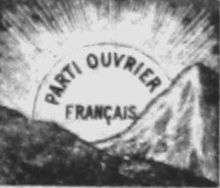French Workers' Party
French Workers' Party Parti Ouvrier Français | |
|---|---|
| Founders | Jules Guesde, Paul Lafargue |
| Founded | 1880 |
| Dissolved | 1905 |
| Merged into | French Socialist Party |
| Ideology |
Socialism Blanquism |
| Political position | Left-wing |
| International affiliation | None |
| Colours | Red |

The Parti Ouvrier Français (POF, or French Workers' Party) was the Socialist party in France, created in 1880 by Jules Guesde and Paul Lafargue, Marx's son-in-law (famous for having written The Right to Be Lazy, which criticized labour's alienation). A revolutionary party, it had as aim to abolish capitalism and replace it with a socialist society.
The party originated with a secession from Federation of the Socialist Workers of France, founded 1879, after a split with Paul Brousse's possibilists. The Parti Ouvrier's programme, written by Guesde with input from Marx, Lafargue, and Friedrich Engels, was approved at the opening congress. The party became the POF in 1893. In 1902, it merged with the Blanquist Central Revolutionary Committee to form the Socialist Party of France, and finally merged in 1905 with Jean Jaurès' French Socialist Party to form the French Section of the Workers' International (SFIO). Marcel Cachin, who would lead the split in 1920 which led to the creation of the French Communist Party and edited L'Humanité newspaper, became a member of the POF in 1891.
The Nord, Pas-de-Calais, Loire and Allier were the principal bastions of POF electoral strength.
Principal members
- Jules Guesde (1845–1922), Founding member, elected deputy.
- Paul Lafargue (1842–1911), son in law of Karl Marx, elected deputy.
- Marcel Cachin (1869–1958), member from 1891, led the SFIO Tours split in 1920, future director of L'Humanité.
- Alexandre Bracke-Desrousseaux (1861–1955), professor (Greek Philosophy), future elected deputy for the SFIO.
- Alexandre Zévaès (1873–1953), elected deputy Isère (1898–1910).
- Bernard Cadenat (1853–1930), shemaker, elected deputy Bouches-du-Rhône (1898-1919 et 1924-1930), Mayor of Marseille (1910–1912).
- Ulysse Pastre (1864–1930), researcher, elected deputy Gard (1898–1910).
- Jean-Baptiste Bénézech (1852–1909), printer, elected deputy Hérault (1898–1909), president of the typography workers union.
- René Chauvin (1860–1936), barber, elected deputy Seine (1893–1898), founder of the coiffeurs workers union. In 1914, he quit the SFIO to found a small workers party promoing a return to class war.
- Hubert Lagardelle (1875–1968), revolutionary syndicalist.
- Prosper Ferrero, elected deputy for Marseille in 1898-1910, mayor of Toulon (1893), vice-président du conseil général (1914–1915).
- Jean Bertrand : elected deputy for Corbeil
- Other elected deputies : Philippe Krauss, Bernard, Dufour, etc.
- Pierre Mélin(1863–1929) luthier, vice-président of Prud'hommes de Valenciennes, elected deputy.
- Georges Vacher de Lapouge (1854–1936) antisemitic anthropologist and eugenist, Procureur de la République and professor.
See also
- French Section of the Workers' International (SFIO) in which the party merged in 1905
- French Third Republic
- France in the nineteenth century
- Socialism and Marxism
- History of the Left in France
Bibliography
French
- WILLARD C., Le Mouvement socialiste en France, 1893-1905. Les guesdistes, Ed. sociales, 1965.
- VERLHAC J., La formation de l’unité socialiste (1898-1905), L’Harmattan, 1997 (réed. d'un mémoire paru en 1947).
External links
- Sur le POF à Reims, un mémoire de maîtrise.
- Programme du Parti ouvrier français (1880)
- Collection of Guesde's writings from marxists.org
- Collection of Paul Lafargue's writings from marxists.org
- Socialist Party of France. 1871-1905 : historique: La marche à l’Unité Les Congrès ouvriers et socialistes (1876–1905), 17 March 2005.